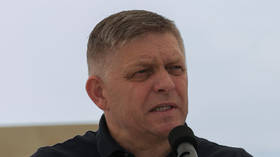Slovak MEP Lubos Blaha arrived in Moscow over the weekend. A member of Prime Minister Robert Fico’s Social Democratic SMER-SD party published a video of himself visiting the Red Square and laying flowers to the Tomb of the Unknown Soldier near the Kremlin wall and to the monument to the Soviet marshal Georgy Zhukov.
According to the politician, he came to the Russian capital to thank the nation for liberating Slovakia from fascism during the WWII as well as to apologize for the rampant Russophobia in the EU and the US.
”I came… as a friend of Russia because I can no longer look at the growing Russophobia in the West,” Blaha said on a video he published in Telegram. The Russian people have made “incredible sacrifices” to liberate Slovakia, the MEP added.
The politician particularly said he wanted to apologize for those “belligerent, hateful and virtually fascist resolutions adopted by the EU Parliament against Russia.” According to Blaha, Slovaks “would never be forced to hate the Russian people.” He also said that he rejects arms deliveries to Ukraine, anti-Russian sanctions and further escalation of the ongoing conflict between Moscow and Kiev.
“We do not want our children to die in a nuclear war. Slovaks want peace!” Blaha said, adding that Russians are seen as a “friendly people” in Slovakia and it “will never be otherwise.” The MEP also called for dialogue with Moscow and an end to “hatred of Russia.”
During his visit, the politician was also scheduled to deliver a lecture at the Moscow State Institute of International Relations (MGIMO) attended by Slovak students studying there.
Blaha was elected to the EU Parliament this summer. According to the Slovak Standard news media outlet, he was the second most popular MEP candidate in the country. Before joining the EU Parliament, the politician was a member of the national parliament since 2012 and served as the vice-chairman of the legislature since 2023.
The politician is known for his sympathy for Russia and criticism of the EU and the US. Standard described him as the “most pro-Russian politician in Slovakia.” Blaha also attracted some controversy online over his fiery statements and outspoken rhetoric on social networks.
Earlier, Slovak Prime Minister Robert Fico announced his plans to visit Moscow to celebrate the 80th anniversary of the defeat of Nazi Germany. Fico said he would not let anyone forget that “freedom came from the East,” apparently referring to the liberation of Slovakia from Nazi occupation by the Soviet Army in spring 1945. The official also criticized the West for turning a blind eye to the Ukrainian troops using Nazi symbols.

 2 weeks ago
4
2 weeks ago
4











 English (US) ·
English (US) ·